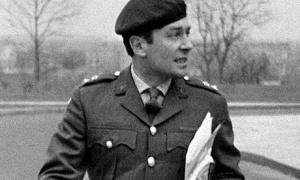Difference between revisions of "Derek Wilford"
m |
m |
||
| Line 11: | Line 11: | ||
==See Also== | ==See Also== | ||
*[[Bloody Sunday - 1972]] | *[[Bloody Sunday - 1972]] | ||
| + | *[[Document:Bloody Sunday: Key Soldiers]] | ||
==References== | ==References== | ||
<references/> | <references/> | ||
| − | |||
| − | |||
| − | |||
| − | |||
{{DEFAULTSORT:Wilford, Derek}} | {{DEFAULTSORT:Wilford, Derek}} | ||
[[Category:Northern Ireland]] | [[Category:Northern Ireland]] | ||
[[Category:British Army]] | [[Category:British Army]] | ||
Revision as of 09:26, 1 July 2010
Derek Wilford was a Lieutenant Colonel in the British Army Parachute Regiment. He commanded the Unit responsible for the deaths of 14 innocent civilians in Derry, Northern Ireland on 30 January 1972. The event became known as 'Bloody Sunday'
Journalist and Playwright Richard Norton Taylor, in an interview with Socialist Review [1] about his dramatisation of the events of Bloody Sunday described Derek Wilford thus:
The cavalry officer, Colonel Derek Wilford, head of the Paras' first battalion, was not only very right wing but deeply old fashioned. He'd been fighting colonial wars - he'd been in Aden not so many years before. And they treated these people in the Bogside as if they were 'natives' in East Africa. There's no evidence of any great conspiracy at Westminster, just an ignorance and an eye off the ball.
